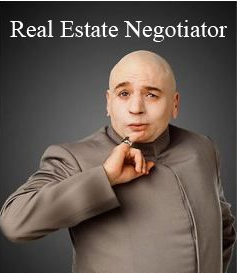Buying a home can be emotionally turbulent. Negotiating the selling price shouldn’t be.
Follow these tips for the best price.
 1. Get pre-approved for a mortgage.
1. Get pre-approved for a mortgage.
In today’s market, sellers can often pick and choose between offers. They will go into contract with the buyer who looks the most likely to close the deal. A buyer who has been pre-approved is likely to have the financial wherewithal to successfully purchase a home, as personal assets, income and credit have been verified. Pre-qualification is just based on what the buyer claims to have as income, assets, and credit; as a result, pre-qualification doesn’t give much credibility to an offer.
2. Ask questions.
Your agent may be able to provide you with important information about the seller’s financial position and motivation. Ask your agent when the seller is hoping to move and why that is the preferred timing. Responses may help you figure out how quickly the seller needs to sell. For example, if the seller is expected to start a job cross country in 3 months, the seller may be willing to compromise on price to get under contract quickly. Also, has the seller already moved or purchased another house? Do they have two mortgages to pay? How many days has the house been on the market? What is its recent listing history? What is the offer history? If there have been offers, why didn’t the house sell? If your seller indicates great motivation to sell, you likely have more wiggle room on pricing and/or terms.
3. Are you in a seller’s market, buyer’s market, or neutral market?
In our recent seller’s market, properties were often priced low or at market level. This pricing strategy encourages multiple bids. Be very familiar with neighborhood comparables (comps), so that you have a good sense of whether the house you’re thinking about buying is high, low, or at market level in relation to the last 6 months of activity. Comparable selling prices help you determine what to pay for the property. In a very hot seller’s market, lead with your best or a very strong offer, since there will likely be multiple offers. Your goal is to engage the seller but keep as much money as possible in your wallet.
4. Avoid contingencies.
Sellers don’t want to take chances. If possible, keep your offer clean. The very cleanest offer would be As-Is cash offer, with no inspection, environmental or sales contingencies. Most buyers want and need more protection than this. That said, an offer with no sales contingency (you have no house to sell) will be far stronger than one with a sales contingency. Keep contingencies for mortgage approval, home inspection, and environmental checks typical in your area, like radon; these contingencies are great buyer protection.
5. Don’t let your emotions drive your behavior.
Buying property is one of the biggest financial transactions you can make. Don’t let your emotions overwhelm your financial smarts. There will always be another house for you! Consider even slight movement on the part of the negotiating seller a sign of interest. Keep negotiating.
Every time you make a concession, ask the seller for something in return. For example, if they ask for a higher selling price, ask them to cover additional closing costs or for a home warranty. If they will not concede, make it clear that you’re willing to walk away. This may motivate them to accept your offer. If there are multiple offers on the table, sellers likley  will not negotiate much.
will not negotiate much.
6. Stick to Your Plan, Regardless of the Competition.
The best homes can draw multiple offers in any market. Determine ahead of time what price will work for your budget. Don’t let a bidding war drive your offer beyond your comfort level on price or contingencies.

